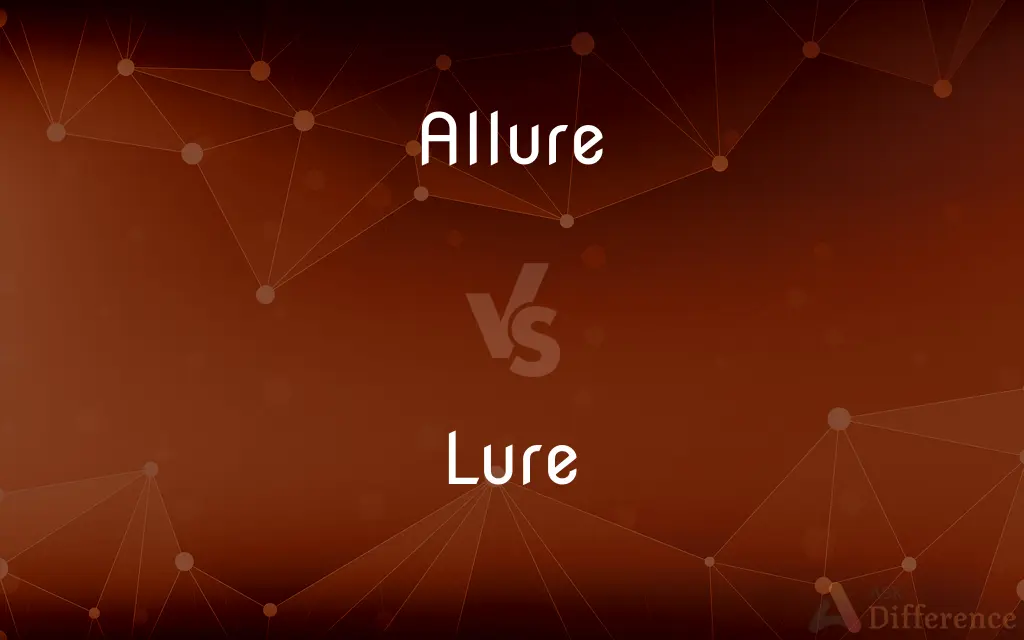Allure vs. Lure — What's the Difference?
By Tayyaba Rehman & Urooj Arif — Updated on March 26, 2024
Allure refers to a captivating charm, while lure is a temptation or enticement often with a deceptive connotation.

Difference Between Allure and Lure
Table of Contents
ADVERTISEMENT
Key Differences
Allure represents an attractive quality that has the power to draw people in through its charm or fascination. This term often connotes a positive attraction that can inspire admiration or desire, typically used in contexts related to beauty, elegance, or unique appeal. Lure, on the other hand, implies an enticement or temptation, usually with the intention to deceive or lead into a trap. While it can be used in benign contexts, it often carries a hint of manipulation or danger, suggesting a method to attract someone or something for a specific, sometimes nefarious, purpose.
The concept of allure is closely associated with a natural, often effortless magnetism that can be found in people, places, or things. It speaks to the aesthetic or emotional appeal that draws others toward it, without implying any negative consequences. Conversely, lure is more about strategy and often involves an artificial or contrived attraction, created to serve a particular aim, such as luring animals into a trap or people into a scam.
Allure can be seen as a quality that enhances the perception of someone or something, elevating its status in the eyes of the beholder and often associated with luxury, sophistication, or the inherent beauty of nature. Lure, however, is more transactional and utilitarian, focusing on achieving a specific result, like attracting customers or ensnaring prey, and may utilize bait or other forms of enticement to achieve its goal.
In literature and art, allure is often used to describe the mysterious or compelling beauty that inspires creativity and passion. It is a source of inspiration and admiration, contributing to the depth and complexity of characters and settings. Lure, in contrast, is frequently employed in narratives as a plot device, where characters are tempted or tricked into situations that challenge them or reveal their true natures.
The distinction between allure and lure lies in their implications and uses: allure is admired for its genuine charm and appeal, enhancing the desirability of the subject, while lure is recognized for its ability to attract or entice, often with the underlying intention of deception or entrapment.
ADVERTISEMENT
Comparison Chart
Definition
An attractive quality that inspires admiration or desire.
An enticement or temptation, often with a deceptive connotation.
Connotation
Positive, captivating charm.
Often negative, implying manipulation or deception.
Associated With
Beauty, elegance, sophistication.
Strategy, entrapment, deception.
Purpose
To draw admiration and inspire.
To attract or entice for a specific aim, possibly nefarious.
Use in Literature
Describes compelling beauty or mysterious appeal.
Employed as a plot device to introduce challenge or temptation.
Compare with Definitions
Allure
Sophistication and beauty.
The allure of Parisian fashion is recognized worldwide.
Lure
Enticement into a trap.
Predators use lure to trap their prey.
Allure
Captivating charm.
The allure of the mysterious island captivated the explorers.
Lure
Strategic attraction.
The sale was a lure to attract more customers to the store.
Allure
Emotional appeal.
The allure of the movie lies in its intricate plot and deep characters.
Lure
Artificial attraction.
Fishermen use artificial lures to catch fish.
Allure
Inherent attraction.
The natural allure of the landscape draws thousands of tourists yearly.
Lure
Temptation with deception.
The lure of quick riches led many into the scam.
Allure
Inspiration and admiration.
The allure of ancient civilizations has inspired countless works of art.
Lure
Utilitarian enticement.
The company used a giveaway as a lure to gather consumer data.
Allure
To attract with something desirable; entice
Promises of quick profits allure the unwary investor.
Lure
Something that tempts or attracts with the promise of pleasure or reward
The lure of the open road.
Allure
To be highly, often subtly attractive
Charms that still allure.
Lure
An attraction or appeal
Living on the ocean has a lure for many retirees.
Allure
The power to attract; enticement.
Lure
A decoy used in catching animals, especially an artificial bait used in catching fish.
Allure
The power to attract, entice; the quality causing attraction.
Lure
A bunch of feathers attached to a long cord, used in falconry to recall the hawk.
Allure
(dated) Gait; bearing.
Lure
To attract or entice, especially by wiles or temptation
Customers were lured to the store by ads promising big discounts.
Allure
The walkway along the top of a castle wall, sometimes entirely covered and normally behind a parapet; the wall walk.
Lure
To recall (a falcon) with a lure.
Allure
(transitive) To entice; to attract.
Lure
Something that tempts or attracts, especially one with a promise of reward or pleasure.
Allure
To attempt to draw; to tempt by a lure or bait, that is, by the offer of some good, real or apparent; to invite by something flattering or acceptable; to entice; to attract.
With promised joys allured them on.
The golden sun in splendor likest HeavenAllured his eye.
Lure
(fishing) An artificial bait attached to a fishing line to attract fish.
Allure
Allurement.
Lure
(falconry) A bunch of feathers attached to a line, used in falconry to recall the hawk.
Allure
Gait; bearing.
The swing, the gait, the pose, the allure of these men.
Lure
A velvet smoothing brush.
Allure
The power to entice or attract through personal charm
Lure
(musical instrument) lur
Allure
Dispose or incline or entice to;
We were tempted by the delicious-looking food
Lure
(intransitive) To attract by temptation, appeal, or guile.
Lure
(transitive) To attract fish with a lure.
Lure
To recall a hawk with a lure.
Lure
A contrivance somewhat resembling a bird, and often baited with raw meat; - used by falconers in recalling hawks.
Lure
Any enticement; that which invites by the prospect of advantage or pleasure; a decoy.
Lure
A velvet smoothing brush.
Lure
To draw to the lure; hence, to allure or invite by means of anything that promises pleasure or advantage; to entice; to attract.
I am not lured with love.
And various science lures the learned eye.
Lure
To recall a hawk or other animal.
Lure
Qualities that attract by seeming to promise some kind of reward
Lure
Anything that serves as an enticement
Lure
Something used to lure victims into danger
Lure
Provoke someone to do something through (often false or exaggerated) promises or persuasion;
He lured me into temptation
Common Curiosities
Can businesses use both allure and lure in marketing?
Yes, businesses might use allure to build brand appeal and lure as a tactic in promotions or sales.
Is a lure always deceptive?
Lure often has deceptive connotations, but it can also be used in neutral contexts, such as fishing.
How does allure affect human behavior?
Allure can inspire admiration, desire, or motivation, drawing people toward whatever possesses it.
Can allure be negative?
While typically positive, allure can have negative implications if it leads to obsession or poor decisions.
How do narratives use the concept of lure?
Narratives use lure as a means to develop plot twists, reveal character flaws, or introduce conflict.
What is the primary difference between allure and lure?
Allure is about a natural, captivating charm, while lure implies enticement often with deception.
Do animals respond to allure or just lure?
Animals may respond to both, depending on context; allure in terms of natural beauty or prowess, and lure as in the case of traps.
Is using lure ethically wrong?
It depends on the intention and outcome; in deception or harm, it’s unethical, but in benign contexts like fishing, it's generally acceptable.
Can a person have allure?
Yes, people can possess allure through their charisma, appearance, or personality.
How can one increase the allure of a product or place?
Enhancing its aesthetic, adding unique features, or emphasizing its emotional appeal can increase allure.
What makes a natural landscape have allure?
Its beauty, uniqueness, or the emotions it evokes can give a landscape allure.
What role does psychology play in the effectiveness of lure?
Understanding human desires and behaviors can make lures more effective in enticing or influencing actions.
How do artists use allure in their work?
Artists use allure to draw attention, evoke emotions, and convey deep messages through beauty and creativity.
Can the allure of a place change over time?
Yes, as perceptions, values, or the environment changes, the allure of a place can increase or diminish.
Can technology have allure?
Yes, technology can have allure through its design, functionality, or the innovation it represents.
Share Your Discovery

Previous Comparison
Logic vs. Sentiment
Next Comparison
Staff vs. RodAuthor Spotlight
Written by
Tayyaba RehmanTayyaba Rehman is a distinguished writer, currently serving as a primary contributor to askdifference.com. As a researcher in semantics and etymology, Tayyaba's passion for the complexity of languages and their distinctions has found a perfect home on the platform. Tayyaba delves into the intricacies of language, distinguishing between commonly confused words and phrases, thereby providing clarity for readers worldwide.
Co-written by
Urooj ArifUrooj is a skilled content writer at Ask Difference, known for her exceptional ability to simplify complex topics into engaging and informative content. With a passion for research and a flair for clear, concise writing, she consistently delivers articles that resonate with our diverse audience.













































